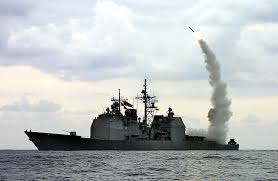 In the aftermath of the 2003 invasion of Iraq the American mainstream news media underwent a period of intense introspection (and by that I mean brief and superficial reflection) about how little critical reporting and analysis they offered in the run-up to the war. Is there a danger that the news media will once again jump on the war bandwagon? Judging by the plethora of dissenting voices in the contemporary debate over attacking Syria, the media has come a long way. Of course, it helps that President Obama is facing a very conflicted Congress, one torn between Republican hawks with Democrat internationalists on one side and Tea Party-inspired Republican isolationists and anti-war Democrats on the other. Those unlikely political allies are making Obama’s decision to turn to Congress for an authorization to use military force a late-summer reality show like no other.
In the aftermath of the 2003 invasion of Iraq the American mainstream news media underwent a period of intense introspection (and by that I mean brief and superficial reflection) about how little critical reporting and analysis they offered in the run-up to the war. Is there a danger that the news media will once again jump on the war bandwagon? Judging by the plethora of dissenting voices in the contemporary debate over attacking Syria, the media has come a long way. Of course, it helps that President Obama is facing a very conflicted Congress, one torn between Republican hawks with Democrat internationalists on one side and Tea Party-inspired Republican isolationists and anti-war Democrats on the other. Those unlikely political allies are making Obama’s decision to turn to Congress for an authorization to use military force a late-summer reality show like no other.
One need not look far for a strong defense of American intervention. Secretary Kerry ably offered that last week, (which seems like an eternity ago), back when we all thought at attack on Syria was imminent. In his speech from the State Department, he couched his argument in familiar themes of American exceptionalism and global leadership, highlighting the need to defend the international norm against using chemical weapons (embodied in the 1925 Geneva Protocol and the 1997 Chemical Weapons Convention), deter their use by other countries and respond to the humanitarian crisis. He came across mostly as a crusading idealist with just a hint of realpolitik.
With President Obama’s decision to turn to Congress, the debate is now fully joined and playing out in both the mainstream news media and social networks. Thanks to that mix of news, analysis and opinion, it’s easier than ever to find a counter-argument to every pro-intervention argument. For example, Shane Harris and Matthew Aid reveal in Foreign Policy that the U.S. was complicit in Saddam Hussein’s use of chemical weapons against his own people in 1988. Far from being a stalwart defender of the prohibition against the use of chemical weapons, the U.S. has in times past done far more than turn a blind-eye, to the point of being an enabler. One wonders how Secretary Kerry would respond to that point?
Thomas Friedman, in this New York Times op-ed, suggests that a missile strike would not be effective and could backfire as a deterrent. He suggests a two-pronged strategy (winningly called “Arm and Shame” as the best strategies these days must be short pithy slogans) to help the rebels win their civil war. Two things I would note about Friedman’s op-ed. First, it was discussed in the House Foreign Affairs Committee hearing this week when a representative asked Secretary Kerry if he was familiar with it and Kerry said he almost always agreed with Friedman, but not in this case. An op-ed published in the morning and referenced in the hearing later that day enters into the kind of rarefied exposure that most editorialists can only dream about. It was a great example of the D.C. echo chamber. Regarding the shaming strategy, let’s be honest here, how many dictators can you think of that cared at all about their public image?
That there has been a humanitarian crisis resulting from the Syrian civil war is beyond doubt, but as Andranik Migranyan points out in The National Interest, U.S. humanitarian interventions have often resulted in unintended consequences, including further harm to civilian populations. In the case of Syria, how does the U.S.hope to target the infrastructure of Assad’s chemical weapons launchers while taking care to preserve and protect the stockpiles of chemical weapons? One mistake in targeting could have disastrous consequences. One bright side to President Obama’s delay in ordering an attack is that our military has been able to continually refine their target list. Still, collateral damage is always a concern.
As the Congressional vote approaches next week, I’m encouraged by the tone and diversity of the public debate over attacking Syria. I don’t think the American people are getting a one-sided or simplistic depiction of this complex issue from the national media and will be able to easily educate themselves and let their representatives know how they should vote on this important issue.